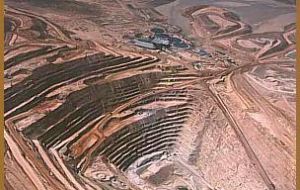MercoPress. South Atlantic News Agency
Predominance of Chinese demand rattles Chile’s economic prospects
 An open pit mine in Chile, the world’ leading producer of copper
An open pit mine in Chile, the world’ leading producer of copper Even when the price of copper, Chile’s number one export, only begun to recover Friday of continued consecutive falls, in September and the first week of October the red metal reached its lowest level in 14 months.
Copper has lost over 25% of its value over the past two months, with most of the loss occurring toward the end of September. The metal registered its biggest three-month loss (July-Sep) since the financial crisis of 2008.
As the world’s largest producer, the Chilean economy is hugely dependent on copper revenues, which account for more than half the nation’s exports. Chile’s copper exports supply over a third of government revenue.
Chile also depends on copper profits to stock its economic stabilization fund. The government uses this fund to conduct countercyclical economic policy, accumulating surpluses during periods of high copper prices and allowing deficit spending during periods of low prices.
The government already cut into this fund significantly in order to ward off a recession during the 2008 financial crisis, withdrawing 4 billion of the 20 billion dollars saved up to that point.
Still, many economists had expected copper to recover by the end of the year. Before the market for copper was fuelled by a huge consumption boom from China in 2003, copper prices rarely rose above 1.40 dollar per pound.
China is now Chile’s largest trading partner, accounting for 23.8% of its total exports, according to the CIA Factbook.
Since the growth of Chinese demand, the price of copper has fallen below the current level on six separate occasions, and it has so far recovered each time.
Economists were confident the steady growth of the Chinese economy would carry prices higher once again. Yet in September the Chinese manufacturing sector contracted for the third month in a row.
With GDP growth stagnating in Europe and the United States (both economies expect to see growth rates of under 2% this year), some fear that world markets for commodities like copper are overly dependent on Chinese consumption.
“With the Euro zone in trouble, any deceleration in China puts the rest of the economy at a high level of risk,” said Frank McGhee, Integrated Brokerage Services LLC in Chicago.
While short term estimates for copper prices vary from less than US$3 per pound to US$6 per pound by the end of the year, Chile’s mining ministry has refused to adjust price estimates downward, firmly believing that prices will recover.
Chile’s President Sebastián Piñera, however, has begun warning of economic deceleration.
“Next year our economy will continue to grow strongly, but not at the same pace that we've achieved in 2011,” Piñera said this week, pointing to the recent drop in value of copper.
Piñera predicted a 2011 growth rate of 6.5%, following a strong 8.4% rate for the first half of the year.
By David Pedigo – The Santiago Times




Top Comments
Disclaimer & comment rulesCommenting for this story is now closed.
If you have a Facebook account, become a fan and comment on our Facebook Page!